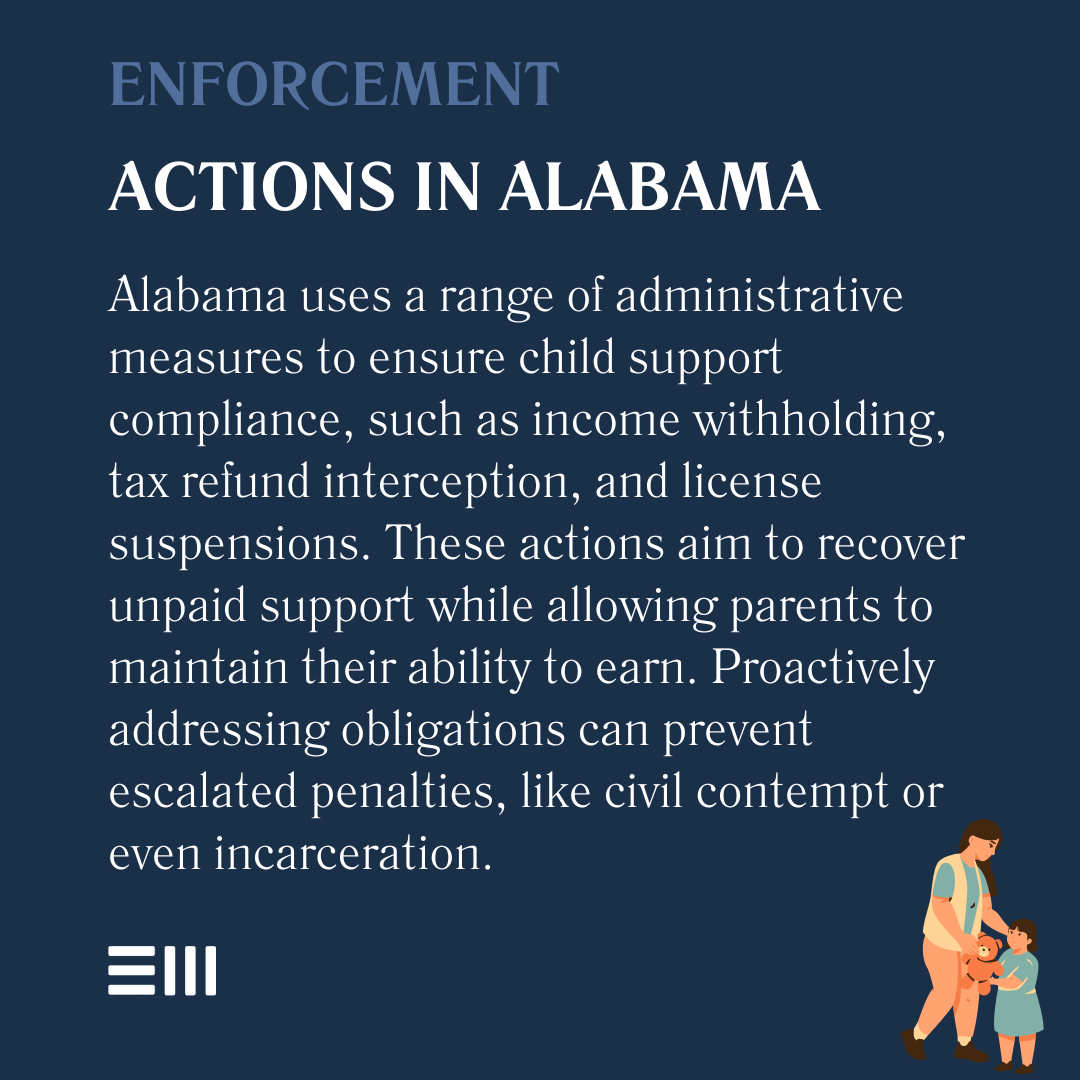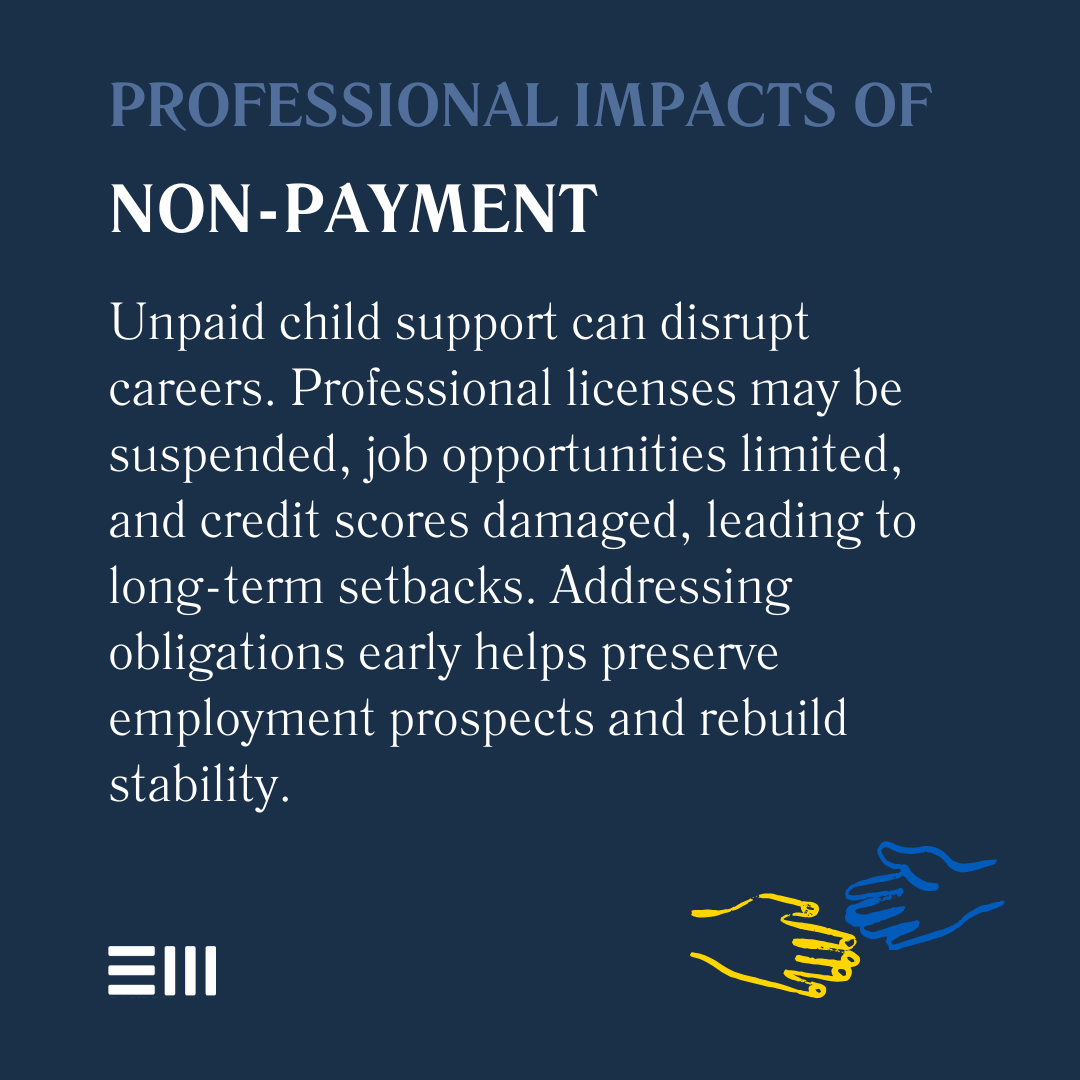In Alabama courtrooms, children's futures hang in the balance when child support goes unpaid.
The state enforces some of the strictest child support laws in the Southeast, wielding tools from license suspension to incarceration to ensure parents meet their obligations.
While the penalties are serious, Alabama courts also recognize that sometimes good parents face real financial hardships that make payments difficult.
Understanding Alabama Child Support Enforcement
The Alabama Department of Human Resources (DHR) works alongside courts to ensure children receive the financial support they need for healthy development and stable living conditions.
Both state and federal laws provide numerous enforcement mechanisms to address non-payment of child support.
Administrative Enforcement Actions
Before turning to criminal penalties, Alabama employs several administrative measures to encourage payment compliance and recover past-due support. These measures aim to bring parents into compliance while maintaining their ability to earn income.
Initial Enforcement Steps:
- Income withholding orders;
- Tax refund interception;
- Credit bureau reporting;
- Bank account liens;
- Property liens;
- Business license holds;
- Passport restrictions;
- Professional license suspension;
- Recreational license suspension; and
- Driver's license suspension.
These administrative actions serve as important tools for ensuring compliance while avoiding more severe penalties. Many parents can resolve their support obligations through these measures before facing criminal charges.
Legal and Criminal Penalties
When administrative actions prove insufficient, Alabama courts may impose more serious legal consequences. The state takes a graduated approach to enforcement, with penalties increasing based on the amount owed and duration of non-payment.
Potential Legal Consequences:
- Court-ordered payment plans;
- Civil contempt findings;
- Monetary fines;
- Required employment searches;
- Mandatory financial counseling;
- Electronic monitoring;
- Periodic court appearances;
- Work release programs;
- Weekend incarceration; and
- Full incarceration.
Courts consider multiple factors when determining appropriate penalties, always aiming to balance enforcement with a parent's ability to maintain employment and continue making payments.
Financial Hardship Considerations
Alabama courts recognize that financial circumstances can change unexpectedly. Parents facing genuine hardship have options for addressing their support obligations legally and responsibly.
Available Options:
- Modification requests;
- Payment plan arrangements;
- Hardship reviews;
- Temporary relief programs;
- Employment assistance;
- Financial counseling services;
- Legal aid resources;
- Alternative payment schedules;
- Debt management programs; and
- Support obligation reviews.
Taking proactive steps to address payment difficulties often leads to better outcomes than waiting until enforcement actions begin.
Impact on Professional Life
Child support enforcement actions can significantly affect employment and professional opportunities. Understanding these impacts helps parents make informed decisions about addressing their support obligations.
Professional Consequences:
- Employment restrictions;
- Professional licensing issues;
- Business operation limitations;
- Contract eligibility problems;
- Security clearance impacts;
- Job application effects;
- Career advancement barriers;
- Bonding capability issues;
- Insurance coverage problems; and
- Workplace reputation concerns.
Addressing support obligations promptly helps protect professional opportunities and career advancement potential.
Long-Term Implications of Non-Payment
Child support enforcement actions can have lasting effects that extend far beyond immediate penalties. Understanding these long-term consequences helps parents make informed decisions about addressing their support obligations.
Financial Impacts:
- Accumulated interest charges;
- Court costs and legal fees;
- Credit score damage;
- Borrowing limitations;
- Insurance rate increases;
- Housing application issues;
- Future employment barriers;
- Retirement account seizures;
- Inheritance interception; and
- Asset acquisition difficulties.
These long-term effects often persist even after bringing payments current, making early intervention crucial.
Interstate Enforcement
Alabama cooperates with other states to enforce child support orders across state lines. The Uniform Interstate Family Support Act (UIFSA) provides mechanisms for collecting support from parents who live in different states.
Interstate Tools:
- Multi-state database matching;
- Coordinated license suspensions;
- Cross-state asset seizures;
- Federal warrant coordination;
- Employment information sharing;
- Address location services;
- Joint collection efforts;
- Reciprocal court orders;
- Federal program participation; and
- International enforcement treaties.
Understanding interstate enforcement helps parents anticipate and address support obligations regardless of location.
Recovery and Rehabilitation
Alabama provides several paths for parents to recover from child support difficulties and rebuild their financial stability. Taking advantage of these programs can help prevent future payment issues.
Available Programs:
- Job search assistance;
- Vocational training;
- Education opportunities;
- Financial literacy courses;
- Parenting classes;
- Mediation services;
- Debt counseling;
- Payment restructuring;
- Employment partnerships; and
- Support groups.
These resources help parents maintain compliance while improving their long-term financial situation.
Technology and Support Monitoring
Modern technology plays an increasing role in child support enforcement and compliance. Understanding these tools helps parents stay informed and manage their obligations effectively.
Digital Resources:
- Online payment portals;
- Mobile payment apps;
- Account balance tracking;
- Payment history access;
- Document submission systems;
- Automated reminders;
- Electronic correspondence;
- Video conference hearings;
- Digital case management; and
- Online modification requests.
These technological tools make managing support obligations more convenient while providing better documentation.
Common Questions About Child Support Penalties in Alabama
Parents facing child support challenges often have questions about their rights and obligations under Alabama law.
Here are answers to frequently asked questions about child support enforcement in Alabama.
What Are the First Steps When Falling Behind on Payments?
Contact the Alabama DHR immediately to discuss your situation and explore payment options before enforcement actions begin.
How Does Income Withholding Work in Alabama?
Employers must withhold support payments directly from paychecks once ordered, typically within 14 days of receiving notice.
Can Criminal Penalties Be Avoided Through Voluntary Payment?
Taking proactive steps to pay support and working with DHR often helps avoid more serious enforcement measures.
How Long Does License Suspension Last?
License suspensions typically remain in effect until making acceptable payment arrangements or paying the past-due amount in full.
What Options Exist for Modifying Support Orders?
Parents experiencing significant financial changes can petition the court for modification of their support obligations.
Find Your Path Forward Today
Addressing child support obligations requires understanding both your responsibilities and your options under Alabama law.
Professional guidance can help you navigate enforcement actions while protecting your rights and interests.
Don't let child support challenges overwhelm you. Our experienced team can help you understand your options and develop a plan to address your support obligations while protecting your rights.
Contact us for a confidential consultation to discuss your situation.


